Compiling interesting thoughts on this mind-wrecking game.
Don't wanna be here? Send us removal request.
Text
Okay but now I'm thinking about the V3 cast and the fact that they were. Really quickly institutionalized because of what happened to Kaede and Rantaro.
I think that it's fair to say that a lot of the characters were or became reactive characters after chapter 1, which makes it not so great narratively speaking--but there is a reason why everyone just, kind of shut down and started to pretend everything was normal and fine and there was nothing wrong with their lives in the living hell they were forced to be in.
Kaede's attempt to kill the Mastermind, Rantaro's plan to thwart the mastermind--all of it was a prime example of "If you go against us, you will die next."
This is especially important to note because unlike the rest of the V3 executions, like in every other game, the first execution was done live/in front of the rest of the cast. Except with Kaede it was a spectacle of why you do not try to thwart the Mastermind. It's an effective way to snuff out any rebellion or unity.
So when the class learned that fighting the Mastermind would get them so brutally killed, they became so scared of their own reality that they escaped into a fake one--where they all ate breakfast in the mornings together, chatted like normal people, and lived their daily lives like this was just any other Tuesday.
They were bashed over the head with learned helplessness and they were conditioned into being the perfect little group of people to be in a killing game. They stopped trying to escape, they stopped trying to be defiant, they idealized escaping but never made any real plans after Kaede's attempt because if they tried, it would end in disaster.
That's also why Kokichi was scapegoated.
He didn't play along with their desperate fantasy for normalcy. He reminded everyone of the death and destruction that was behind them and in front of them and he continued to rebel ever so subtly. He tried, he really did try, but when you got a group of kids fearing for their lives so much that they give up on escaping because the first person to show rebellion ended up dead, it's really hard to make them unlearn that learned helplessness.
So they see Kokichi as the outside, the troublemaker. He's ruining their desperate attempts to lead normal lives in these hellish conditions, reminding them of the horror that they are trapped in a killing game with no real way out, reminding them that the next murderer could be their new best friend or even themselves, or the next victim could be either or, they react violently. That kind of reality isn't easy to face. So they reject Kokichi, the one ruining their only semblance of Normalcy, because he is pushing them to remember that their situation is far from normal.
And if they remember that, then their small threads of sanity crumbles with it. Because they were taught very quickly that rebellion ends with death--so if they try to live in reality, they have to face that they are essentially going to die in that hellhole whether they comply or rebel.
So there's no point in rebelling. They're dead either way. So why does this troublemaker keep pushing them? They don't want to be pushed. They want to pretend it's all normal for their own sanity. Why is he is insensitive? Why is he so cruel?
And that's why Kokichi ended up as a scapegoat--because everyone was so desperate for happiness and normalcy that they couldn't take the cruel reality they were living in.
252 notes
·
View notes
Text



















Some contextual shifting (or... apparently shitting, in Miu's case):
Shuichi questions his past self's wish to 'die with everyone else', before being distracted away from it- by the others talking about not being able to remember the details of the Ultimate Hunt. Then later, he recalls but challenges it from his known self's perspective. With Kaito's encouragement, he emboldens himself to continue, to not give up and lose the case- ergo, to avoid dying with everyone else.
In this way, Shuichi side-steps the entire issue of what his past self had said and why, reframing it to the present moment. Though considering what he's grappling with there, it's understandable that his focus is more on the self that he recognises to think - and possibly say - similar kinds of things given his mental health issues. Whereas this 'alternate version' of Shuichi... can't put yourself in the shoes of someone you've never even 'met', right? He can imagine 'dying with everyone' in the context of the killing game he's in, but it makes no apparent sense why sealing memories would lead to that.
Only the 'sealed Shuichi' knows. And frankly, if there's something thorny and personal like suicidal ideation, there's a good chance that the present Shuichi doesn't want to know what he thought at all.
14 notes
·
View notes
Text

Isn’t it so interesting that Monaca acknowledges the faces of those in her class, who never come up again, but sees her father as just another background character?

784 notes
·
View notes
Text





I think this is a reference to this

he's basically saying whether or not she actually killed rantaro is irrelevant because her INTENT is what helped spur the killing game into action
76 notes
·
View notes
Text
Since this is nagging at me, and the point of contention in Shuichi's background and 'style of detective' is being... kind of a pain in the arse, to put it lightly, let me try to lay out the odd situation with his detective background as plainly - and, as fairly - as I can. Here goes:
He did detective stuff as a favour to his uncle, that is, was not a formal detective but an apprentice to one. It's likely he wasn't constrained to roles, in this respect.
His tasks involved catching out cheating partners, finding lost pets and eventually, finding runaways. The latter of which - according to his uncle - was a 'preventative measure', to stop them before crime occurs. Shuichi's job was, explicitly, to stop them before it got to that.
He picked up a motto from his uncle, the 'coffee stains on someone's shirt' metaphor. Extraordinarily vague, and one he used in the context of a 'heavy burden' when talking with Ryoma, but the phrasing can imply 'stains' of a person's (perceived) guilt. You could infer that this is a matter of catching out people who are cheating, but you can also generalise it to crime. What's more, the mixed ideas with this motto - that Ryoma was faintly amused by, thinking it strange - makes it feel like something is not communicated adequately.
He read a psychology study, whether purely of interest, what his uncle taught him etc. is unknown, but the key component of said study was how it tricked people- that is, into believing cold water was hot (this is especially interesting to me given that this kind of extreme trick was a theme for DR2's shtick likened to a 'fictional world', and he brought it up in the Virtual World, which DR2 was based in, and Shuichi declares the game 'fiction' by the end, so it really does feel significant, even if not directly related to detective work). So, we're talking some applied psychology, here. Hold that thought...
Shuichi is a good liar- at least, one of his skills is to sway a group into believing him, sometimes with emotion as well. In that sense you could say he's a good actor, which seems unusual for someone who's mainly a sheltered character. That said...
His uncle's policy on runaways was that it was 'necessary to follow up with runaway and client both', and Shuichi explains the policy as 'making sure both parties are happy'. If Shuichi is involved in this process, he is - to some degree - trained to work with people. Is de-escalation part of this? You would expect so, at least. What's more is Shuichi could not confirm if this was a typical detective's policy, just that it was his uncle's.
Shuichi solved a murder case. We don't know how he happened on it, only that it was 'by chance'. We know that lost-pet grade detectives don't solve murders, although the runaways part of the tasks was, at least partially, linked to crimes. What kind of crimes? We just don't know. You might assume however, that one such case could lead to a murder, particularly if a de-escalation attempt were to... fail (this is speculation as an example).
In summary: the extent of Shuichi's uncle's 'education' of him, is vague enough you can infer (as I did) uh... a mixture of things, with no clear idea of where the boundaries in those things are. You also don't know if this is 'above board' training that is typical of a detective, especially with the presentation of a murder case - something exceptionally out of whack for an apprentice to handle, although not an unthinkable consequence - and possible mixed communication going on between him and his uncle.
Also? You don't know how truthful Shuichi himself is being - to himself especially - since he's a known liar. While that's not proof he's lying about anything, it is at least a concern since at the least, he may have cause to lie to defend others based on feeling (and this is something he does in trial 2 for Maki regardless that she wasn't guilty of Ryoma's murder, she still had involvement in the situation, but the nuances of that aren't the point here).
Anyways, how this pans out in the game is up to you, but I felt compelled to clarify my own logic from the start re. this, since it does get kinda-

-from here in terms of my theory, so the 'making sense' can be hard to do. I hope this much is clear, though.
#psychology#danganronpa analysis#ndrv3#danganronpa v3#shuichi saihara#shuichi's uncle#it's weird that not many people pay attention to this weird ass uncle he's so sus
36 notes
·
View notes
Text
[Me, watching the Bittersweet Gamers play through DR:AE a while ago and proceed to make a draft about it, to then forget about forever. All of what’s written here is probably a year old by this point, sans a few adjustments. Though since someone got talking about Haiji, I have this impulse to share…]
-
Daymon comments: ‘Haiji is such a weird name, how do you write it?’
Okay now I’m curious about the kanji and meanings, let’s see-

[His given name, “Haiji ”(灰慈) means something along the lines of “mercy of the ashes (i.e. of a deceased’s)” - somewhat matching his color scheme. It may also be reflecting his motive in creating The Resistance was to avenge the death of his father.]
This puts me in mind of a quote from ME3- “stand in the ashes of a trillion dead souls and ask the ghosts if honor matters”. Haiji himself is not a merciful character in the least, and he is very much ‘ends justify the means’ towards the end. So just eyeballing that, the meaning seems to be something along the lines of ‘let the ashes give mercy, because I won’t’.
That or, the ‘mercy’ part is uhhhhh, ‘ironic’. To put it… uh… nicely.
(This secondary meaning is one I happened upon the first time, but I’m leaving my initial thought process under the cut for your discretion. It’s not gonna be pretty. Consider yourself warned.)
Keep reading
#danganronpa analysis#danganronpa theory#ultra despair girls#danganronpa another episode#dr ae#haiji towa#name#findings
18 notes
·
View notes
Text

regarding the "cospox is actually an allergic reaction to fictional characters" theory, here's ambiguous wording from Tsumugi in DRS
#danganronpa v3 analysis#danganronpa v3 theory#danganronpa s#drs#danganronpa spoilers#tsumugi shirogane#finding
9 notes
·
View notes
Note
Your twin theory stuff has been going on for quite some time, have you considered making a run down on it because it’s a bit hard to find all your points and information on it because of how long you’ve spent on it and I’m very curious but struggling to put it all together
(Alright, take two since I got stuck for a loooong while)

This is a basic explanation of the Ouma-Monokuma twin theory! I will do my best to condense the concepts down in a way that flows simply and is easily understandable, but it will be hard to cover everything while keeping to the most relevant information. So if this doesn't do the job, I might finish the much longer meta on ao3 at a later date, in which I will cover… everything I possibly can, no holds barred and without the blog links. Which will take considerably longer and need very careful execution. (Yeah, this is the short version…)
General disclaimer: this is a view informed by at least six years of trial and error, ruminating in canon for patterns and their meaning. Through all this, I recognise that it is still a theory, and it doesn't make others’ ideas less meaningful. All the same, I need you to understand that this theory and its analysis is fundamental to my view of Danganronpa as a whole, not just my feelings about Ouma. And in my opinion, the presence of bad writing in DRV3 does not negate that view, either. So if you believe that it does, I hope we can agree to differ on our reader responses instead, after all is said and done. Thank you.
Alright, with that out of the way, dropping this under a cut as it's lengthy. Though rather than a lot of detail on what this means for Ouma's character right now, I'm going to dig through the surface with the basis of reframing, roles, academy history, psychology, narrative style for the mastermind, and the broader consequences, with feelings from my perspective to wrap up. I hope that will help give a perspective of the theory world, so that any evidence I give should fit easier in the future.
⚠️ Reader discretion is advised- this content details abuse further on and will be marked like this! ⚠️

[‘Then this story's not over.’]
The way I see this situation is basically like a 3D sculpture with two different pictures- ‘the fiction’ and ‘the conspiracy’. That is to say- in the ‘fiction’, there are things that are effectively motifs or throwaway remarks (such as, Ouma's comment about having a brother in his FTE), but in the ‘conspiracy’, they become clues to a hidden interconnected situation. A puzzle in the meta, essentially.
To begin, I’ll outline components of this framing, as these are necessary to understand how this turnabout works.
Catbox world: the question hanging in the air, 'is HPA fiction, or is it real'? What would the consequences of the latter be for the game and outside world of DRV3? In order to begin answering this, I think this way:
Domino effect: 'when you learn a new fact, you learn something else along with it'. Ex: if HPA is real, a very large and clandestine organisation may also be real, since one was connected to HPA's library. With that possibility opened, there are… a lot more potential threads coming from it.
Unreliable narrator: is there something Shuichi is missing? In Ouma's lab, along with the complete history file there are monitors and a hatch, and in his dorm room there’s a whiteboard with pictures and notes scrawled on, the latter two Shuichi doesn't even notice. There are things he cannot verify too - such as Rantaro's odd memory of the forgotten Prologue - which is left up to us, the players.
Contextual reframe: with the new information, we can infer for example that record keepers of the past are made obsolete, and since the HPA history was in Ouma's lab, this could make him a viable record keeper. If TDR's agenda is with historical record, its identity may be the secret society involved in conspiracies. This can greatly affect some of Ouma's comments in hindsight- one relevant to this is his FTE remark about ‘tricking the entire world’.
With doubt already on the most basic aspect of the 'fiction' narrative (that is, ‘HPA is fiction’) we can apply this principle to the Flashback Lights and by extension, the idea that the cast must also be fiction, too.
Ex: Shuichi and Kiibo were made to see the Flashback Light panel in a way that was rigged up to be seen- it should not have been visible to multiple persons, so it's likely to have been tampered. We know Shuichi to be helpless with computers, so he would not be able to verify if anything else is amiss (ex. Kubs Pad and other options being withheld). What's more, with ‘fiction things’ - such as the Shukuchi method for Ryoma - being relevant in both the ‘weird backstory’ and in the main narrative, there's a possibility that some of the Lights are real memories or at least closely based on their real experiences.

[‘A liar like me knows their own kind.’]
When you reframe the context in an excessive manner like this, it can also affect known roles, even events and relationships. I reason it beginning like this:
Tsumugi becomes a patsy for Monokuma. Just like the fake Makoto in DR2 led the narrative to trap Hajime, Tsumugi misled others similarly, with incomplete knowledge of her own cospox. That is, her cospox being real in the sense of the effects on her person, doesn't necessarily mean that HPA is fiction, because it's about her perception
Kiibo becomes a patsy for Monokuma, someone whose true (military) nature was obfuscated to himself on a metaphysical level, via code-hijacking. This means that high-powered functions he has are strange to him, and he’s easily manipulated into believing lies about his function (such as ‘strength of a senior citizen’, and the ‘audience surveys’ that he cannot verify)
Ouma becomes Monokuma’s double, like Mukuro taking the identity of Junko, as the monitors and hatch are a direct parallel to Junko. This means that Ouma has a deeper relationship and notably intrinsic connection to Monokuma as well as less freedom from him, likely has extensive knowledge of everyone, and has his own memories. And from that, an incentive to guide people he considers his friends, to minimise himself and his own struggles while working against Monokuma subtly, even to manufacture his disappearance in ch5 to take the fight to Monokuma alone
Shuichi becomes the ‘shadow mastermind’, like Izuru- the ‘traitor protagonist’ who sealed and sabotaged the group’s will to live, while losing his memory of that. This is reflected by Chapter 1's case, wherein he had created the perfect setup for Kaede to enact her own plan to kill, and had conflict over his actions that he had tried to shut away. It also provides context for Ouma being especially wary of Shuichi, noting on the whiteboard to ‘be cautious’ of him, especially if he has a relationship with Monokuma as well.
These are the big four as far as the mastermind agenda is concerned, but another interesting role-reframe is the Monokubs. Remember that Shirokuma and Kurokuma were fragments of the mastermind, and Shirokuma’s role in UDG is to deceive the player? What if the Monokubs had such a situation, split up into comedic personality fragments? Were the melodramas telling some sort of story as well- the story of Monokuma?
If so, there may be some clues from them. But first…

[‘Designed like a school’]
As to the academy’s lost mystery, it’s possible it was originally an experiment. Rantaro’s hunch was that there was ‘someone behind Monokuma’, and in Salmon mode he points out that Monokuma could have ‘taken over the facility’. A bunch of files in Shuichi’s lab suggest that the culprits of the scenarios were noted for their ‘tricks’, likely pertaining to their Ultimate talent.
A concerning matter is that the details of the Gopher Project’s plans were crossed out, with us unable to see why youngsters of Ultimate status were required. Doubly concerning is that Ouma himself appears to have amazing, even supernatural ability, demonstrated in ch5 with his scripting- a talent such as that is in line with Junko’s abilities.
Speaking of that, it must be said that Junko's true ability was left a mystery by the game's end. It was also a subject of much curiosity by HPA, so if Ouma is a supernaturally talented person, that could speak volumes as to his own position. His status as an 'invisible Ultimate’ alone raises questions as to why it has to be hidden, or rather, why he has to obscure it. It could be that he is oppressed by the talent system itself, and if that's the case, perhaps he is its guinea pig along with V3's Monokuma. But it's not just about Ouma's ability- if Monokuma too had a similarly strong supernatural talent and/or circumstance, that could explain not only his posing as a ‘god’, but Angie’s mysteriously intimate knowledge of others' personal ideals through such a ‘god’. That is, if she was possessed by someone with knowledge of the cast's ideals, and who was exploiting them in the Love Hotel.
Moreover, if Ouma and Monokuma were supernaturally gifted, there's a good possibility that if the vault clues were a layered clue symbolic of them- the ‘light’ and ‘dark’ Monokumas depicted on the ‘twins’ clue for the vault - then they were not only siblings, but twins- identical twins. This allows for another ‘report card misidentification’ a la Junko-Mukuro, while the Flashback Light panel refers to the ‘Gamemaster’ rather than ‘ringleader’ (meaning an identical double could interact with it), and from a lore perspective, twins were known in Danganronpa Kirigiri to be the subject of (highly unethical) research, and identical twins would be the most sought after for genetics reasons.
Such research could eventually wind up creating Ouma and his brother - seemingly the highest of any known talents - through a form of eugenics, not unlike Byakuya’s backstory. From there, there's no telling what could have happened…

[‘Eh…?’]
Now I can get to the psychology behind the bear. If a person behind Monokuma had such a past with this academy, traits can be speculated:
⚠️ Content: incest, child abuse, sexual abuse, psych torture/institutionalisation. ⚠️
Vengeful: in ch2, Monokuma suggests he may hate the cast for something, and tells them to ‘work for the answer’. Interestingly, Monotaro (leader persona) makes note of ‘red lies’ in the Salmon mode, and red lies are for revenge.
Extremely traumatised and mentally ill: if it is Ouma’s brother, and he’s wearing a straitjacket, this could imply institutional abuse. Monokuma’s behaviours in ch3 (a mental shutdown) and ch4 (depression) could denote severe mental damage, and having the academy cleared of bugs gives credence to him having an affliction with bugs like Ouma ( foaming at the mouth and passing out).
Depraved: in ch4, Ouma noted he would ‘strangle the one he loves’ to ‘keep his eyes on him’, and appears to play a similar threatening, possessive role in the Love Hotel. Implied in the Monokubs’ melodrama, Monokuma may have coerced his own sibling into having relations- though he may have forgotten his sibling entirely due to trauma.
People pleaser: Ouma says that he ‘lies to entertain people’ in his Salmon mode ending, which could reflect his persona (Monokuma)’s desires. It may be that his desire to ‘not be boring’ feeds into this persona, too, as it's something so serious to him that it was shown as basically a dying wish.
In this sense, the mastermind can be similar to Monaca- as she took control over the city (while Monokuma stated to have taken over the country), became mentally ill as a result of the abuse inflicted on her, lied (about an injury) in order to make her abusers nicer to her, and became depraved in a way childish and sadistic (in how she toys with Kotoko and Nagisa, for instance). There's also the narrative effect of obscuring her trauma with unreliable narrator, and even Monaca’s own warped sense of humour that obscures it in tandem.

[Twin with supernatural talent (Junko Enoshima), a result of experimentation (Izuru Kamukura), childishness complex (Monaca Towa) and all combined (Kokichi Ouma)]
For narrative styles, DRV3's Monokuma is a culmination of approaches to make the game’s mystery truly warped to its core. Taking the masterminds’ actions from the past games:
Junko selectively picked photographs to sow discord about the group’s reality
AI Junko (a plant by Izuru) tried to lead Hajime into making a choice without proper context
Monaca led Komaru through a growth journey to use her for impact at the end
These can be attributed to:
the Flashback Lights- some real, others ‘rotten apples’, but overall context is dubious
the ‘It is fiction’ declaration- may be a leading question, again with dubious context
Shuichi’s ‘confidence growth’- that makes him more credible to those watching outside
(As for ‘context being dubious’, it should be noted that the Twilight mystery has a similar vibe in terms of how it is chopped up and misrepresented on the first viewing. This is particularly interesting when you factor in the mixed Kubs Pads giving other characters information.)
Speaking of ‘using’, Monokuma talks about how someone could be used by expressions of gratitude. In parallel to this, Shuichi is talking about how he was happy to be ‘useful to others as a detective’, and regards their gratitude personally. But it’s concerning that Shuichi and his history is a topic for ‘Monokuma Theatre’, when you factor in what Monaca did in UDG.
The basic concept is: with Monokuma’s agenda towards the end being to throw out foreshadowing and mystery - to deny its purpose - he wants you to make the decision of ignoring the heart, discarding the mystery and the path to the answer. In this sort of vague and unnerving way, a ‘hidden mastermind’ is like a progression of Monaca’s style. Symbolically, Shuichi’s journey seems to be one where he is on the fringe of going astray the entire time, and in this reading, he ultimately does with the loss of the game's mystery.
What follows is the player's re-examination of the canon context and in this case, a ‘salvage effort’ of what was lost. And ultimately, in the quagmire of broken context, Ouma's mixed relationship with Shuichi is fuel for thought, because his cryptic behaviour - like the game he plays in his FTE - keeps you guessing on what he's been trying to say.

[Members… of what?]
So, factoring in earlier recontextualisation - of the large organisation likely spanning the world - is the idea brought up during Ouma's FTE, that I question like this: could Shuichi have joined a nefarious organisation after all, and following in Salmon mode: is there any indicator Ouma has concerns about Shuichi’s intentions in general (that is, regardless of whether or not his past self would have been capable of less-than-moral decisions)?
What about others in the cast- a Prime Minister who had run away from her post, a military robot, a super inventor, an assassin? An artist with odd brainwashing powers, a musician with the ability to connect to others’ hearts through music? Because given that the DR2 group had affected the world with their talents after being manipulated, it's possible that the V3 group’s talents had a similar part to play, too. For instance, Kaito’s FTE detailed the possibility of communicating with aliens, and trading technology with them- and as it happens, there is notably a very weird technology in the academy, capable of ridiculous feats. This kind of unknown in the narrative speaks of a whole world that we barely know, even now.
If this kind of world is what Ouma is burdened by, something beyond the protagonist's understanding, that too is a story waiting to be told. And his strange interactions with Shuichi could be at the heart of this story…

[‘Just hit the reset button on your feelings’]
As for the relationship with Shuichi, that is particularly difficult to give in evidence- partly given the culprit in his backstory, and how if Monokuma was that culprit - someone with a strong agenda against Shuichi - that might link to both twins. But due to the death of one of the siblings in that backstory, it warrants a supernatural idea such as resurrection, that has yet to be proven viable in-universe. If we remember Angie having a weird supernatural air about her though, and that she was implied to be in a cult, you could still infer that cults were involved in the supernatural. It’s entirely possible that a high-profile cult had come to the point of using resurrections, although that’s very much deeplore, as is the supernatural in general.
So while I can’t say too much about technical lore, like with the organisation, I can talk about the vibes I have with the theory, to focus on a sense of grounding in character instead:
“Ouma and Monokuma are both sidelined by the narrative. A not-insignificant part of that was caused by Shuichi in his past, even if he was led into the cause unwittingly, and the actions of Shuichi’s present self in missing memories. As a result, Ouma is in a nerfed position during the game despite his supernatural talent. Unable to say anything without surveillance, he is under a great deal of stress and pent up, ambivalent feelings - not least towards Shuichi and Monokuma - that he tries mostly to deflect. After all, it would not do to give too much away, and ruin his own plans.”
I have a detailed ‘song lyric analysis’ of sorts to tie to this, as a way of exploring feelings. Part of the reason I’d go this far, is Ouma as the designated ‘narrative scapegoat’ has always just fit well for me, given that the cast is shown to struggle with their treatment of him. Even leaving analysis aside, I feel it would be very satisfying (cathartic, even!) to explore an angle where he was suppressed, and that his position was legitimately the consequence of others actions right from the start, making the whole ‘pretending to be a villain’ situation even more painfully ironic.
Plus it would be a welcome change from the notion of ‘misguided morally-grey antagonist who needs to change’, in my opinion, as Ouma’s unchanging self is something I hold particularly strongly. So instead of the arc of drastic change, the thing to explore would be how he functions and struggles with others (in mundane as well as grand ways), and also gets them to change, to understand him. It would also be interesting to expand on the theme of talent abuse, to have a Monokuma who was a product of the corrupt talent system- rather like Izuru was, but this time fully present in the narrative, and in tandem with someone else connected to him.
Overall, I feel that a situation where the protagonist thinks he’s won, while a mysterious someone has been struggling in the sidelines to affect change, is a real goldmine for a mystery situation. Especially from replaying the game, and picking up odd signs that something may not have been what it seemed. There may not be much to go from there (as things stand right now, at least) but the palpable frustration means that through this perspective, I can - at times very viscerally - imagine Ouma’s frustration and powerlessness. That alone colours the game and the interactions in a whole new light for me.
I hope this helped clarify at least some of what the heck is going on- and why I would even see Ouma this way at all, if it’s so convoluted. I have struggled to put it into words all this time, but with the pieces flying in my face from every direction, it’s hard to not try putting them together. I usually don’t game on Hard Mode like this, but something about Ouma compels me- whatever Kodaka’s intentions, I believe him when he says Danganronpa V3 is without end.
Thank you for reading!

#drv3#danganronpa v3 theory#danganronpa v3 analysis#ndrv3#ndrv3 spoilers#kokichi ouma#monokuma#danganronpa theory#danganronpa analysis
67 notes
·
View notes
Text
It just occurred to me how young the warriors of hope had to be when they were taken in by Junko, like, several years passed between the start of the tragedy and the attack on towa city, and they couldn’t be older then like, 11 when they attacked, add in the time junko would need to indoctrinate them and fuck they would have been like 6-8 years old hoooly shit, hoooooly shiiiit. They were like second-third graders, that’s so fucking young, that’s so tiny, fuuuuck, it’s already so bad to imagine their backstories at their current age but at fucking like the age of 7? Holy shit. Valid of them to do an adult genocide I do believe.
39 notes
·
View notes
Text
DRV3 is looped
I am certainly a supporter of the "DRV3 is a simulation" theory. There has been a lot of discussion about it before, both on reddit and tumblr. But if it is a simulation, how about an assumption that it is a looped simulation? There have been hints about it thrown in the dialogue, implicating that what is happening in the game can somehow happen again.


There's also a comment from Tsumugi in the Ultimate Talent Development Plan where she says that the "world" (and the Academy is referred to as a "world" many times) she's going to cosplay is the one she will cosplay 1,000 times.

But to me, the most obvious hint is the existence and the structure of Virtual World in ch4 - a looped structure with a wall that has been brought up a hundred times during the trial and plays a big role in it.

It makes me think about the End Wall that surrounds the Academy and the strange comments about it.

There's no way the whole Virtual World thing isn't representing at least something that happens in the main story. And as we see in epilogue, there is truly nothing outside of the End Wall, just like there's nothing outside of the Virtual World's map. The epilogue is in general practically a reveal that the whole Killing Game is a simulation (at least as I see it) but what do you think about the notion of it being looped?
#ndrv3#danganronpa v3#danganronpa theory#danganronpa analysis#danganronpa v3 analysis#v3#danganronpa v3 spoilers#v3 ending#end wall#simulation#loop
87 notes
·
View notes
Text
Okay DRV3 Fans Let's Talk about Canon Ages.
Because I woke up and my brain connected the dots, and because some of you are fucking weird about High-school students. So let's clear the air here--and let's just say they're probably over 18 years old.
In my Gonta rant (which yes I'm linking here, go read it) I call him a young adult. Some people are under the impression (like that anon I got last night) that the V3 cast is canonly 16 or younger due to... whatever the fuck reason. But! I am here to argue a counter point--that the V3 Cast is actually much older and are more college age than young highschoolers.
First of all, let's remember the fact that in all DR games, the cast has gone to high school for some amount of years before their memories are wiped. V3 Also has this feature, and it is within the canon story that these kids remember attending HPA.
Now whether or not you believe this to be true is irrelevant right now because I need you to remember that the backstory for these characters was that they were being hunted down by the Ultimate Hunt, which means they were Ultimate Students at HPA first. Then they had their memories wiped to go into hiding. Yada yada.
The important part actually comes from Kirumi, however. Kirumi is the character that proves that the V3 cast is older than 18 years old.
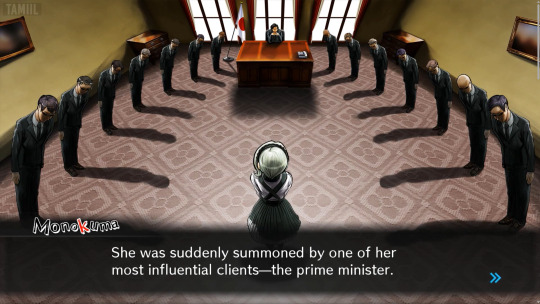
Remember this tidbit--where Kirumi was the maid of the Prime Minister? Well, when do you think she became the maid for the Prime Minister, do you think?
I have an answer for you.
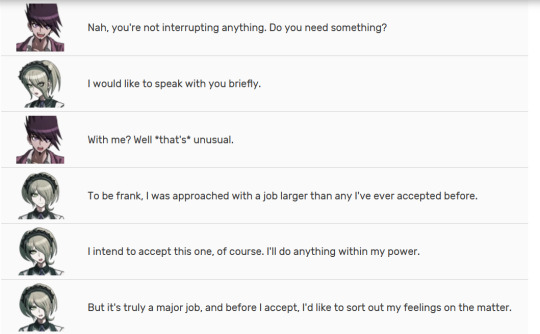
This is the dialogue from Kaito's "My Future" cutscene from DR:S. The "My Future" Cutscenes take place at the end of the run with the character chosen, and DR:S takes place right at the end of their 3rd year of attending HPA.
Kirumi doesn't specify who she will be working for, but considering that this person is such a big deal what she felt the need to consult Kaito about it, to help her sort out her feelings, I think we can all agree this is heavily referencing V3's plot where she is the Prime Minister's Maid.
This means that Kirumi only took the job as the Prime Minister's Maid at the very end of high school.
That means that by the time V3 runs around, she's well out of high school.
Now you can argue that V3 and DR:S aren't in the same canon--and you'd be right! I would never consider them to be canon to one another. However, this scene shows that in DRV3 and in DR:S, the intention for Kirumi to have been the Prime Minister's maid started at the very tail end of her time in high school. Same character, same backstory, different situation.
Meaning by that logic, Kirumi--as well as her other classmates--are over 18 years old in V3.
They are young adults.
296 notes
·
View notes
Photo



Stay friends.. with the group, huh.
It’s like he had some affection for them once upon a time..
#danganronpa v3#ndrv3#danganronpa analysis#danganronpa theory#monokubs#monokid#monodam#monotaro#monophanie#monosuke#monokuma
36 notes
·
View notes
Text
[Reposting this because I'm dumb stupid and don't know how reblogs work! This was supposed to be a reblog of this post by @g0nta-g0kuhara, a multi-part analysis of Kokichi Oma in Chapter 4]
Ooh a meta post! Sends me back to when I was first researching the DRV3 fandom before playing the game (I'm a little backwards, I know...). I only read the one part, but I wanted to chime in with some additions on top of the existing analysis.
Interestingly, the "neutral Kokichi face" that's highlighted in this post is one of two "neutral faces" that Kokichi makes throughout the game. That would be stand_005_037, or Kokichi's 37th sprite.

The other "neutral face" is the next sprite over, stand_005_038, which appears in a different context from the previous sprite. The difference between the two is really not terribly noticeable at a glance, so here's a visual.

Up to now, I've considered sprite 37 to be Kokichi's "unserious neutral", as his expression appears more relaxed than that of sprite 38, what I've thought to be his "serious neutral".
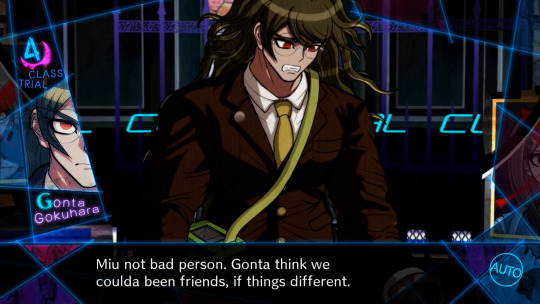
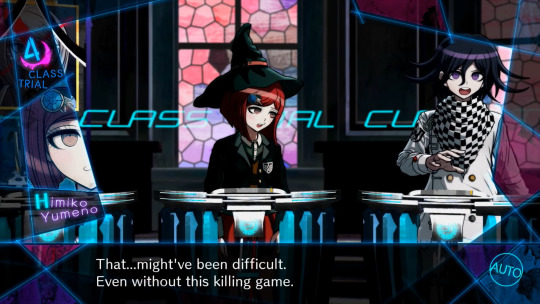


You know he's not serious when he's agreeing with Maki.
With the information from this analysis, though, it might be more accurate to call it his "masking neutral". Kokichi will use sprite 38 in low-emotion situations when he has a point to get across, like here in the Chapter 3 post-trial.
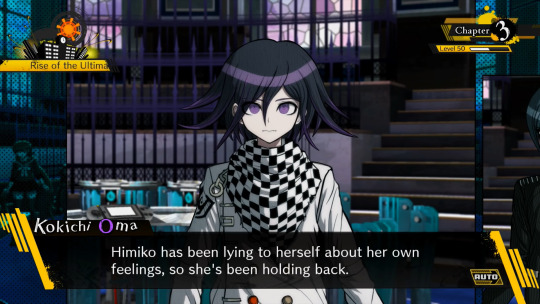
However, in high-emotion situations, as said in the initial analysis post, Kokichi is likely trying to hold himself back. That's when sprite 37 comes in.
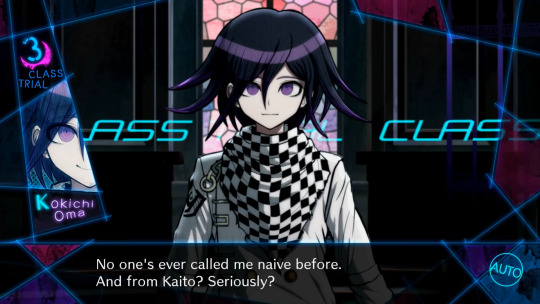
Bro is either stifling a laugh or seething with anger in there
Regarding Kokichi's sprite 38, there's some stuff I've come across which loosely implies that it initially had a different design. When Kaito recaps his conversation with Kokichi in the hangar in the Chapter 5 post-trial, the conversation is portrayed with a sepia tone. The sprites for this conversation aren't really "sprites", per-se -- the entire scenario is actually stored as a series of background images in the game files.
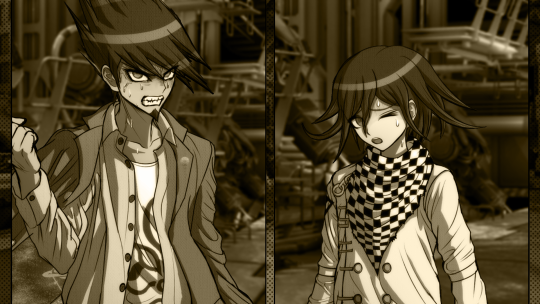
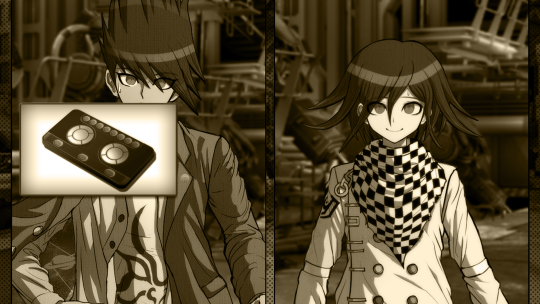
One image that caught my attention, however, was bg_201_11:
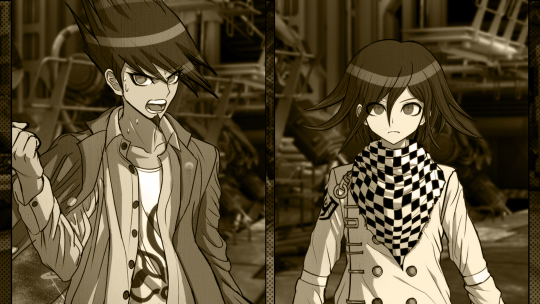
On my first playthrough of the game, I dubbed this sprite "Kokichi angy"
This image stands out at a glance because of the Kokichi sprite, which isn't seen anywhere else in the entire game. Compared to the other images in the set, this image actually seems to be from an older build of the game, as the shadows in the background, shading on the sprites, and position of Kokichi's arm-belt-things are different.

bg_201_11 vs bg_201_01
My guess is that this unused sprite was an older version of sprite 38, especially since the current sprite 38 has similar errors as the older sprite.
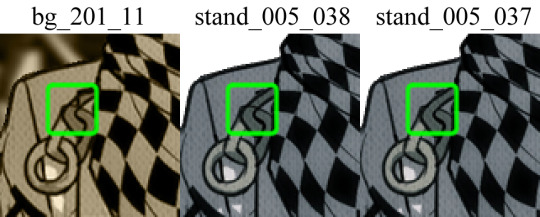
Personally, I'm glad "Kokichi angy" wasn't actually used in the final game. He looks a little too much like a wet cat.
On another topic, also related to the linked analysis: let's talk about the ever controversial whiteboard note written by Kokichi under Shuichi's photo which, in the English localization, reads "trustworthy?"
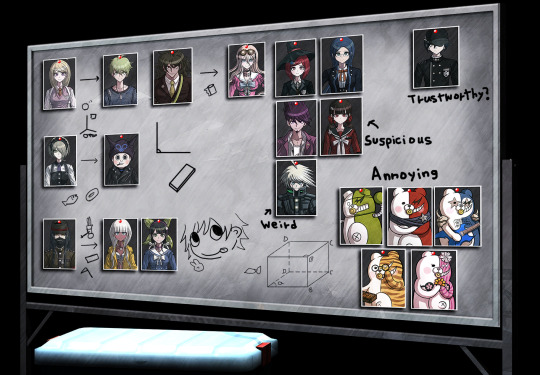
As many people have pointed out, both now and in the past, this note was translated oddly and the original text was 「油断ならない?」 (yudan naranai?).

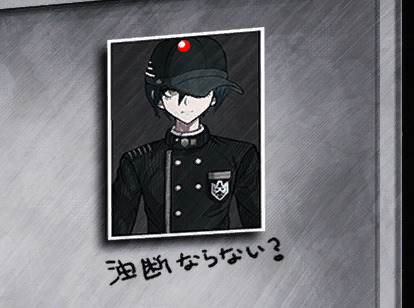
Though it's often translated by fans as “sneaky or cunning”, the literal translation is actually “don't be careless”, with “yudan” meaning “careless” and “naranai” meaning “must not (be)”. This is translateable in most situations as “dangerous”, hence that being the stock translation supplied by Jisho.org.
After all, "don't be careless" has essentially the same meaning as "this is dangerous", in most situations at least (think mountain climbing, or traveling through a dark alley; you wouldn't want to be careless because it is dangerous, you don't know what to expect so it's treacherous and sneaky).
When translating a note regarding a person, though, I would think "don't be careless" would be more appropriate, especially considering Shuichi isn't particularly dangerous compared to some other people in the academy whose dangers are well known (*cough cough* Maki)
You can find the independent translated meanings of yudan and naranai on Jisho as well as on Wikitionary (yudan, naranai).
So, Kokichi is essentially telling himself to stay on his guard around Shuichi, since he doesn't know what to expect from him. His attempt to team up with Shuichi in Chapter 4 was probably his confirmation that Shuichi wanted nothing to do with him, and that he should formulate his plans accordingly. It would probably have been ideal for him to have Shuichi on his side, as he saw Shuichi as a wild card (rather ironically; I'd imagine the group perceives Kokichi as the wild card of the group). So despite the translation error, the points made by the linked analysis still hold decent ground.
All in all, despite my belief that Chapter 4 is absolutely ridiculous, the linked analysis is quite good when one assumes Chapter 4 is logically sound (it's not), and still holds up even to someone like me who really dislikes Chapter 4 for its severe logical fallacies (my suspension of disbelief was absolutely thrown out the window when I played it... but maybe that's a matter for another day)
#kokichi ouma#danganronpa v3#ndrv3#danganronpa spoilers#danganronpa theory#danganronpa analysis#sprites
72 notes
·
View notes
Text
The Chapter 4 Essay Part 2: Gonta Gokuhara
A metapost on my thoughts on Kokichi’s overall motivations and Gonta’s actions during ch4. Split into two parts. You can find Kokichi's half here: (LINK)
This section is admittedly a little bit shorter than Kokichi’s, but that’s just because Gonta’s motivations are a lot more clear than Kokichi’s. That being said, I’m also worried that since I am so obsessed with Gonta I might forget something important that supports my point because to me its kinda self-evident. So if anything seems like it’s missing or doesn’t make sense, please let me know!
In my opinion, nothing Kokichi did to Gonta was personal, in both positive and negative ways. He didn’t target Gonta because he hated him in particular, but he also didn’t team up with him because they were already friends. Gonta was just an easy target for him to take advantage of, both for stopping Miu from killing him And in progressing his plan to stop the killing game. Gonta’s actions in chapter 4 are a combination of genuine manipulation by Kokichi using what made him an easy target, and motivation caused by Gonta’s desperation and preexisting insecurities that had been growing since the start of the killing game.
Throughout v3, the one thing that Gonta wants more than anything else is to protect his friends from the killing game. It’s pretty clear that he trusts his physical strength more than any other part of himself. The literal First thing Gonta says in a group setting with everyone else is this:
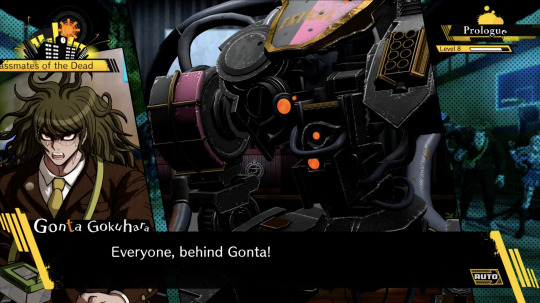
(prologue)
He doesn’t even know anyone yet! But he’s already prepared to physically defend them from the exisals! He also tries to stop Kaede’s execution along with Kaito and Tenko:
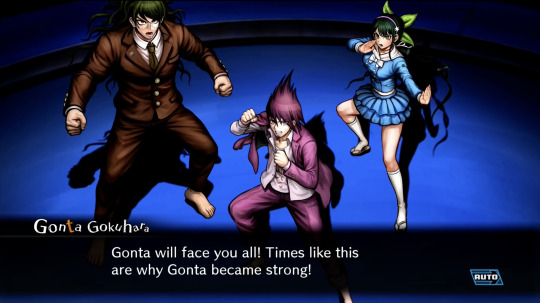
(post trial, chapter 1) (And- wait- is Gonta missing his bug box in this cg? Oh my god….)
Gonta is shown to be most confident when doing things that involve his physical strength. There’s less hesitation and uncertainty in his actions, unlike what you can often see in him during class trials or group discussions.
Gonta is also more than willing to give up his life for his friends, even as early as chapter 2.
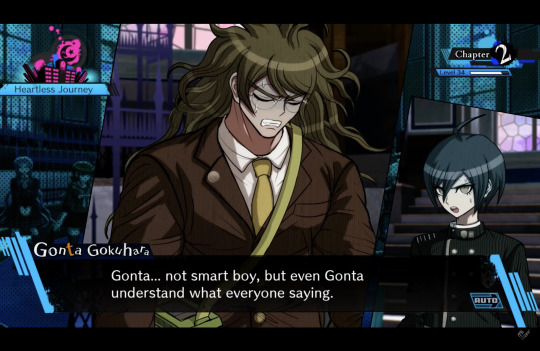
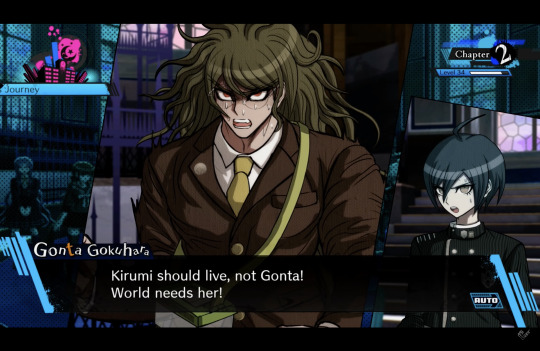
(post trial, chapter 2) (he’s the first one to make this suggestion)
Outside of physical defense against active threats, Gonta really just wants to help his friends in any way he can. Here’s a couple examples:
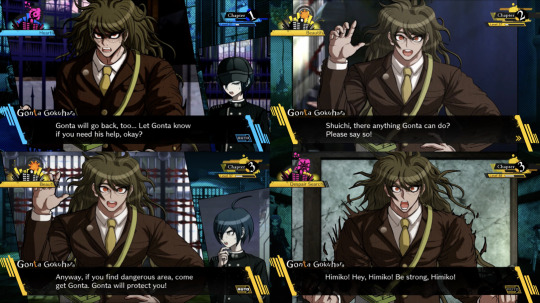
(post-trial, chapter 1) (daily life, chapter 2) (daily life, chapter 3) (investigation, chapter 3)
On the other hand, Gonta has really bad self esteem issues. It’s telling enough that one of Gonta’s common floatlines is literally “Gonta idiot…” When he’s not casually calling himself dumb he’s apologizing for it. For this (and honestly, many other parts of Gonta’s character that I’m pointing out here) I really recommend just paying close attention to Gonta on a replay of the game. I could literally sit here for a week finding and listing all the times Gonta calls himself stupid, but it feels pretty self-evident considering how much he does it. Here’s just one example:
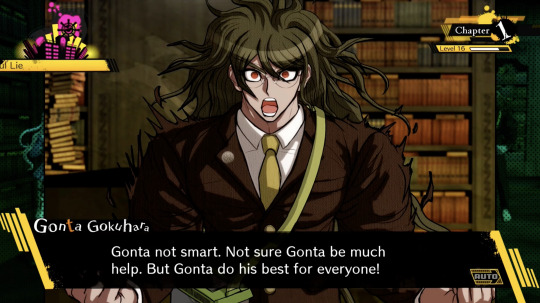
(investigation, chapter 1)
It’s the combination of his deep desire to be helpful and protect the people around him, and the repeated deaths of his classmates, that really start to wear on him as the game progresses. I think this mixes with his already present self worth issues to form a pretty nasty complex; Gonta explicitly blames himself for almost every single victim’s death in the game. Let’s walk through the chapters for a moment here:
Ryoma: “Gonta coulda saved him… No, Gonta shoulda saved him…! // When piranhas attack Ryoma… If Gonta had dived into tank… / Then… Gonta coulda help Ryoma. But Gonta got scared. Too scared to do anything. / Sorry! Gonta really sorry!”
In chapter 3, Gonta joins Angie’s student council out of his desire to protect everyone. This is made clear in how, before pulling him in, Angie compliments Gonta and calls him smart. She then says this:
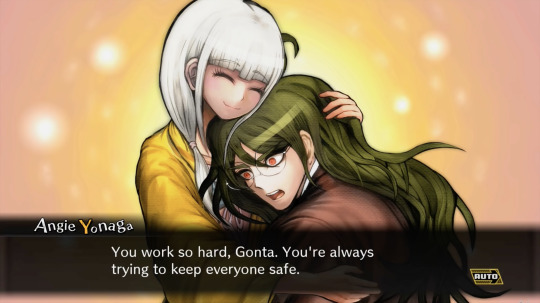
(daily life, chapter 3)
This time, organized as a part of the student council and with Angie’s god on his side, Gonta hopes that he can finally be useful and successfully protect someone.
Angie: “Maybe Angie got attacked while she sleep in her room, and get brought there? / If so… Gonta coulda saved her! If only Gonta saw! / But Gonta was sleeping… Sorry, Angie… Gonta no could save you!”
…To quote my favourite V3 lets play (shortonegaming) on this moment: “He made up a version [of Angie’s death] so that he could blame himself.”
Tenko: “T-Tenko…! Gonta so sorry… Gonta no could protect you!” and then a little later “It’s all Gonta’s fault…! Gonta fail to protect friends again!” and AGAIN later “Gonta so ashamed…! Why Gonta no could protect friends!?”
That’s two deaths in a row that Gonta (at least believes) he was right next door to and failed to stop. You can see from how he says this repeatedly, with lots of dialogue from other characters in between, the sheer amount that this is impacting him.
Miu: “But… why this happen…!? Why… Miu killed!? / Gonta not understand… Gonta not understand anything… /…But Gonta frustrated and sad! Gonta no could protect Miu! // Gonta so sorry! Gonta sorry he no could protect Miu!” Even with Miu’s death, to which he’s waking up disoriented and confused, he blames himself for failing to stop it.
(Sidenote: Looking at all these reactions back to back makes Gonta’s disorientation after waking up from the virtual world SO much more visible. I left the beginning out of the quote I took, but when you first talk to him during ch4’s investigation, he doesn’t say anything for a few moments. This is very unlike his immediate, intense reactions in the earlier chapters. When he does start speaking it feels kind of disjointed, uncharacteristically calm, and confused before he starts riling himself up blaming himself for Miu’s death. I never really noticed it before looking into this. It’s kind of disturbing)
The only reason I personally think he doesn’t react this way about Rantaro immediately is due to being in shock that someone died to begin with. That doesn’t stop him from saying this not long after:
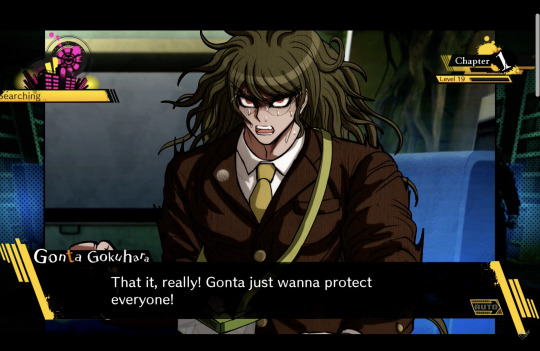
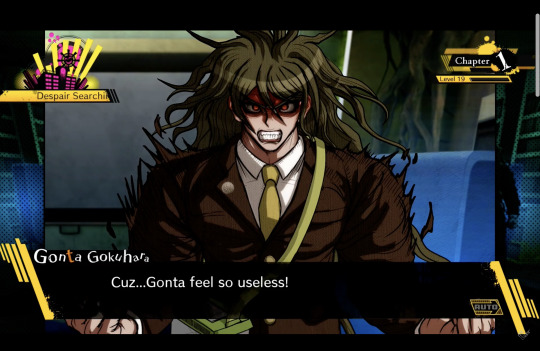
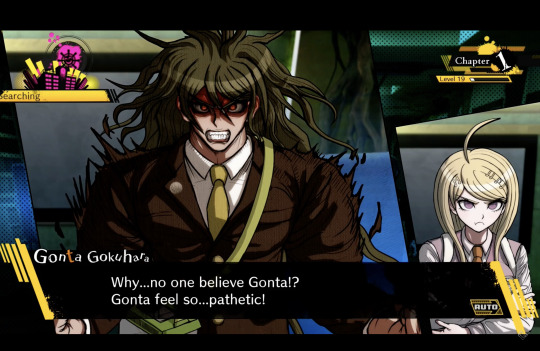
(investigation, chapter 1)
This complex- made of the desire to protect everyone, self loathing, and feelings of uselessness at being unable to help investigating due to being “stupid” and failing to protect anyone physically, the only thing he thinks he’s good at, every. single. time- only gets worse with each chapter. And in Chapter 4, Gonta finally reaches his breaking point.
At the beginning of Chapter 4, you can talk to Gonta as Shuichi is leaving to meet up with Kaito and Maki to train. He tries to stop Shuichi, worried about a murder potentially taking place at night (again), but Shuichi reassures him that he’ll stick by his friends and that he can’t break his promise to meet up with them. Gonta responds like this:
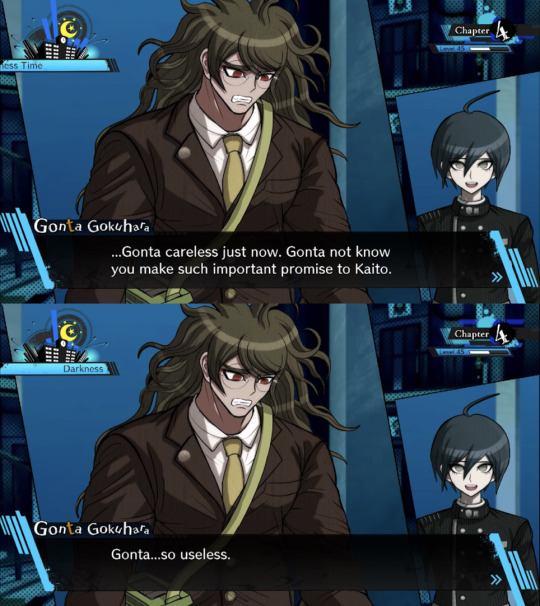
(daily life, chapter 4)
Which leads to him saying he’s made up his mind, and has a plan. Which is, of course, to try and take down Monokuma physically, even if it costs him his life. He initially drops the suggestion after Miu starts talking about the virtual world, but the day after, it’s still bothering him.
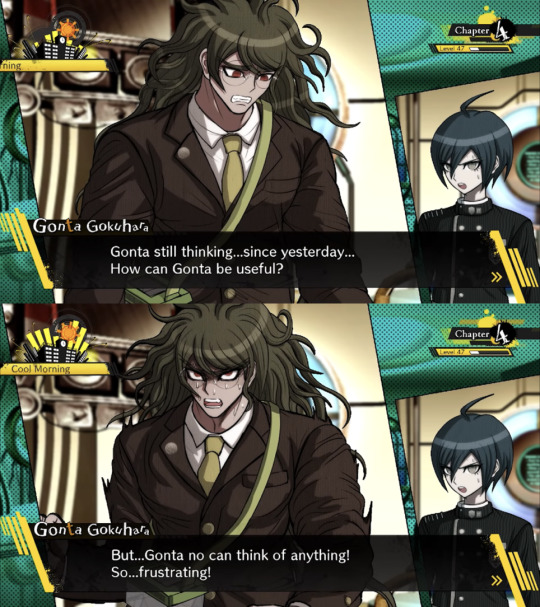
(daily life, chapter 4)
Almost every free time event you have with Gonta this chapter (except for like, one, where he talks about the “tiny bugs” he can barely see), Gonta is trying to think of ways to help.

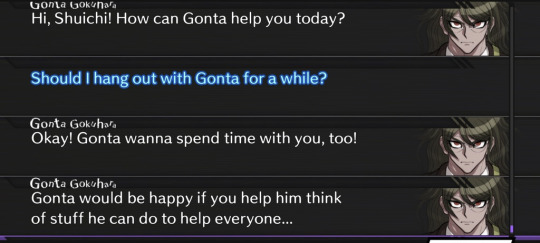
(free time, chapter 4) His last possible free time event before Miu takes everyone into the virtual world has this dialogue, which is just so sad to me.
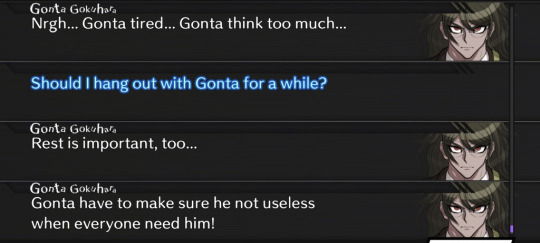
(free time, chapter 4)
“Helping everyone” and not being “useless” are almost the only two things Gonta talks about this chapter. It’s this mindset and motivation that made Gonta an easy target for Kokichi to take advantage of. He’s in a bad place mentally, and nothing he does seems to help anybody. Not to mention, with the student council gone, he’s suddenly just kind of… alone. There’s no one there (other than potentially Shuichi, during free time) to keep him steady.
And yeah, I am definitely not including Kokichi here. A strong reason I don’t think Gonta chose to go along with Kokichi out of friendship was because of this interaction early Chapter 4:
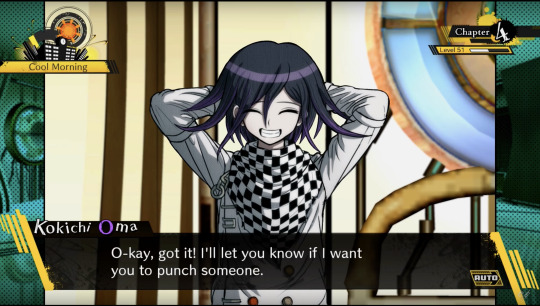
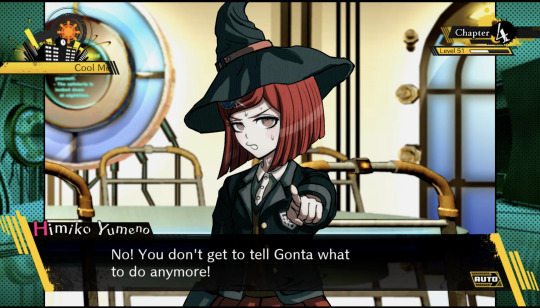
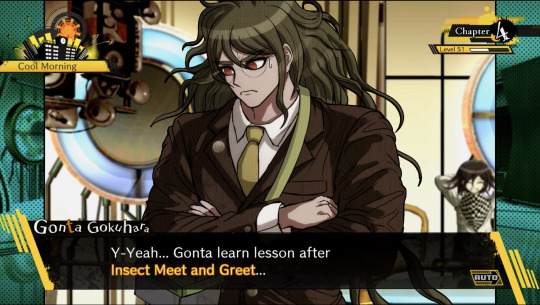
(daily life, chapter 4)
Gonta’s trust in Kokichi was broken because of the events of the insect meet and greet. The insect meet and greet’s implications for Kokichi and Gonta’s relationship are a bit strange, but since it’s not super relevant to chapter 4, I’m not gonna get into it. The point is, regardless of the nature of their relationship in chapter 2, it’s clear that Gonta doesn’t consider Kokichi a very trustworthy person in chapter 4. It’s likely that he doesn’t consider him a close friend either. I hesitate to say that Gonta didn’t consider him a friend at all, because he’s Gonta and he wants to have faith in everyone, but at the very least he was trying to be wary around him.
This explicit distrust in Kokichi might make it seem strange that Gonta went along with Kokichi at all in the virtual world. But in reality, Kokichi was very aware of Gonta’s distrust in him, and used it to his advantage in setting up his plot.
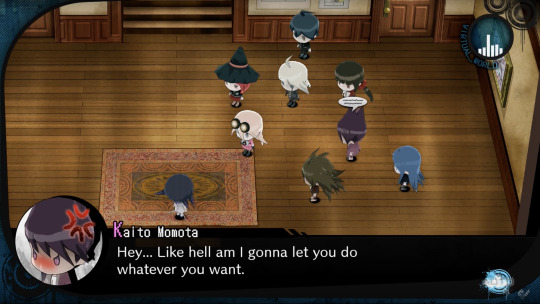
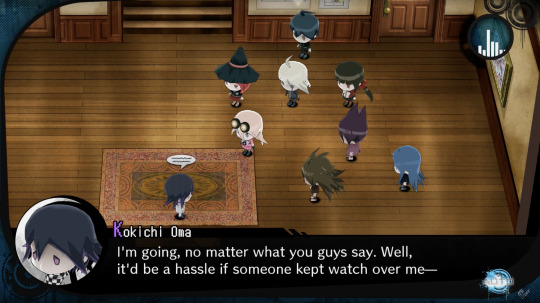
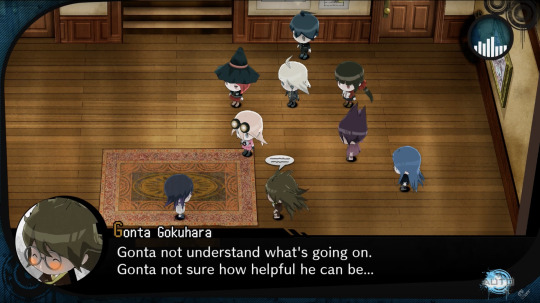
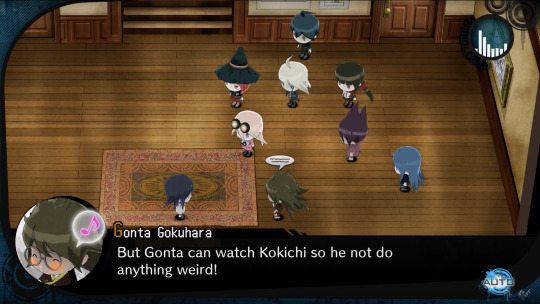
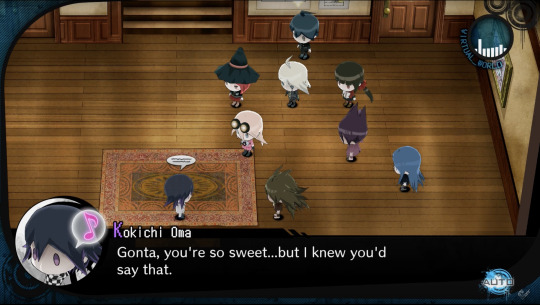
(daily life, chapter 4) (I skipped some dialogue in this exchange, but it hits the main points)
Kaito inadvertently eggs Gonta on here, but Kokichi literally drops the idea at Gonta’s feet. Gonta isn’t going with Kokichi to help him look, he’s going to make sure he doesn’t get into any trouble. And as Kokichi said, he knew Gonta would offer to do something like this if given the chance.
Kokichi uses Gonta’s distrust in him again when they encounter the flashback light holding the secret of the outside world together. Gonta’s immediate instinct was to go find everyone else, but Kokichi yells for him to wait, and then this happens:
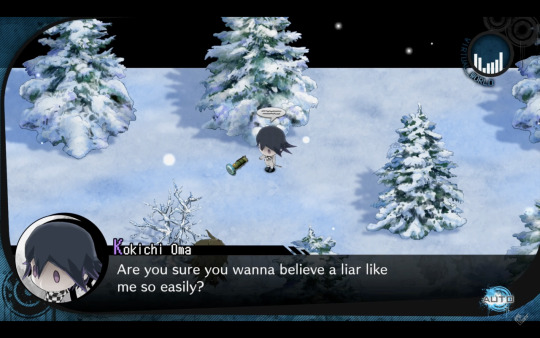
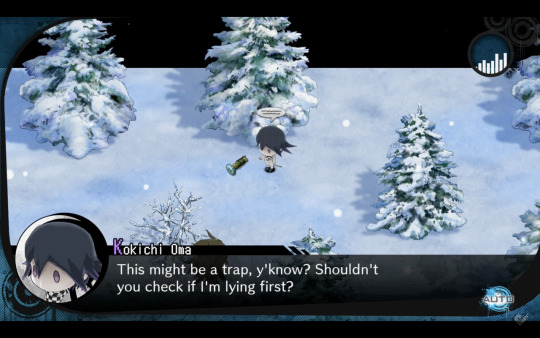
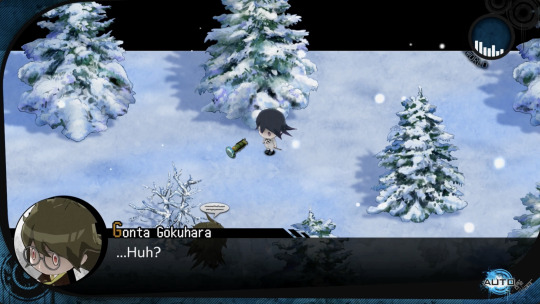
(post trial, chapter 4)
He KNOWS Gonta doesn’t trust him, and with that distrust, he can make him doubt anything he says. I’ve already talked about how Gonta is ready to give up his life for everyone else, especially this chapter, so suggesting that he check if the light is a trap set up by Kokichi is guaranteed to make Gonta pause.
But it doesn’t stop there. Kokichi pushes harder:
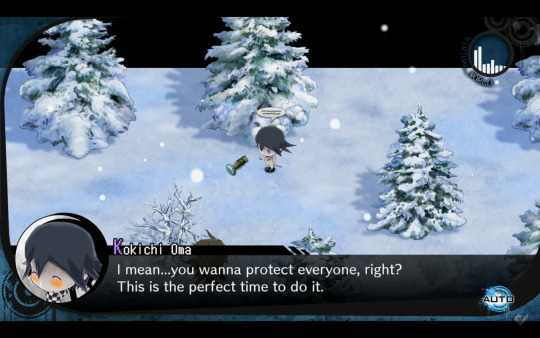
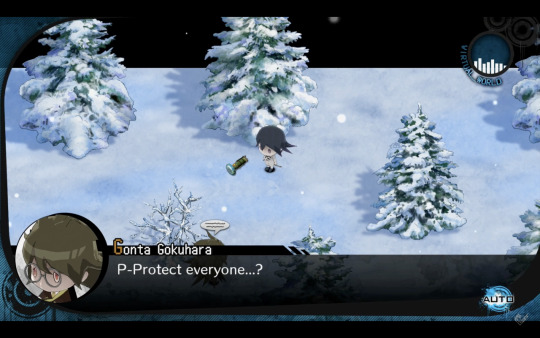
(post trial, chapter 4)
Gonta thinks for a moment, but this is what made him choose to come back and look at the flashback light himself. Here, Kokichi uses the thing that has been haunting Gonta more than anything else all killing game, especially this chapter. He knows Gonta has tried and failed to protect people, he knows how upset it makes him. What better way would there be to convince him to do whatever he wants than to offer a way for him to finally be “useful” to everyone after failing them again and again?
Anything after this point and before Miu’s body discovery is purely headcanon, so I won’t get into my thoughts on that. But I think this moment shows that Gonta was under a lot more control that people often think. I don’t mean to say that Kokichi is entirely blameless, or that Gonta wasn’t manipulated at all. But AlterEgo!Gonta says himself, “No, [we] not tricked,” because he wasn’t. He made the choice to see the secret of the outside world on his own, and made every choice after that to continue with their plan. There was no trickery involved. It was Kokichi’s carefully chosen words that dug right into his insecurities, doubts, and hopes that directly influenced him into making the choice that he did.
You also have to keep in mind how absolutely unstable Gonta must’ve been at this point. He was already nearing a breaking point with his feelings of powerlessness before going into the virtual world, but then he got hit with the secret of the outside world. AlterEgo!Gonta openly admits that it made him feel suicidal. (“Cuz, when Gonta remember the secret of the outside world, Gonta think… /…it would be easier… to die.”) With the outside world and the killing game both inescapable hells, Gonta just couldn’t imagine any way out. And then Kokichi suggests the mercy kill plan. In his state of mind, Gonta truly believed that this could be the way to finally “save” everyone.
Of course, Kokichi had only just recently seen the secret of the outside world too. Even though he must have known it wasn’t true, he had no idea the extent to which it was a lie versus the truth. He probably wasn’t in a very good mental state either. But still, just like he would do again in chapter 5 to everyone else, Kokichi used the despair caused by the secret of the outside world to get Gonta to go along with his plan.
This is what I believe was the driving force behind Gonta’s half of the Kokichi and Gonta dynamic in chapter 4. Gonta’s self loathing, which was present before the killing game began, compounded with his desire to be useful and protect everyone else from the threats of the killing game. As more people died, Gonta became more and more desperate to do literally anything to help everyone else. Kokichi used these things about Gonta to push him to do what he wanted him to.
…To close off, there’s this moment right before Gonta and Kokichi leave to kill Miu that’s really stuck with me.
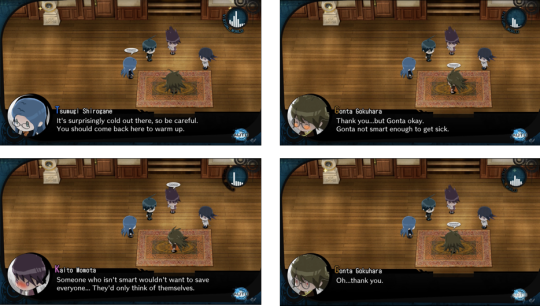
(daily life, chapter 4) (Read left to right, top to bottom)
It’s not common for the other characters to defend Gonta’s intelligence. But Kaito, unknowingly, says just the right thing to Gonta at just the wrong time. Knowing that Gonta was about to set things in motion to mercy kill everyone for this exact reason… I wonder if Kaito remembered this moment. Maybe it was just another reason he got so defensive over him during trial 4. I just wish he had said something like this to him sooner.
If you got all the way here and read all this… first of all. THANK YOU! Oh my god. I’ve been working on this essay for several days now between studying for my finals. It feels really great to have it all written out after literal years of loving V3 and loving this chapter. Please, please, please let me know your thoughts! Even if you disagree with me! Chapter 4 is so special to me and I love talking about it!! o/
(Screenshots taken on youtube from justonegamr, Bittersweet Gamers, ShortOneGaming, ProZD Plays Games, and my own copy of v3 on IOS. Thank you @/ishimaruhourglass for helping me find some of these!)
112 notes
·
View notes
Text
The Chapter 4 Essay Part 1: Kokichi Ouma
A metapost on my thoughts on Kokichi’s overall motivations and Gonta’s actions during ch4. Split into two parts. You can find the Gonta half here: (LINK)
I think the way Kokichi acts when he’s telling the truth says something crucial about his personality. When he’s telling the genuine truth, his expression becomes carefully neutral.
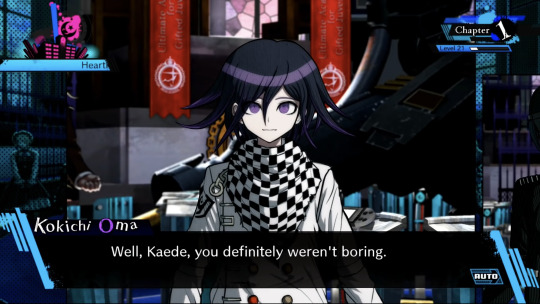
(post trial, chapter 1)
To me, it feels like he’s trying very hard to keep this face of neutrality. Normally, he’s able to expertly express any emotion that he wants to. In these moments, its almost like the emotion he’s feeling is so overpowering that he’s trying to repress it in order to maintain control over the face he presents to everyone else, but isn’t quite able to do so.
Kokichi is very careful about keeping people from seeing the parts of himself that he doesn’t choose to show. His villain persona and constant lying is part of this- He wants to keep people away from him. During the events of the killing game, he uses the distance that he creates in many ways. Part of it was that not having many close alliances allowed him to go off and do whatever he wanted during daily life. This let him explore the school and investigate the truth of the killing game without interruption or much attention. Lying also gave him distance between the game and himself. Pretending that the killing game was fun might’ve been his way to cope with everything that was happening. I think Kokichi is really damn good at separating himself from his emotions, lying to himself to do what he thinks needs to be done. This line from Chapter 1 is pretty telling…
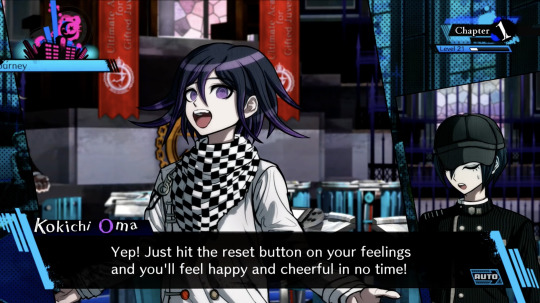
(post trial, chapter 1)
This was also something he says himself to Kaito in the exisal hanger during chapter 5.
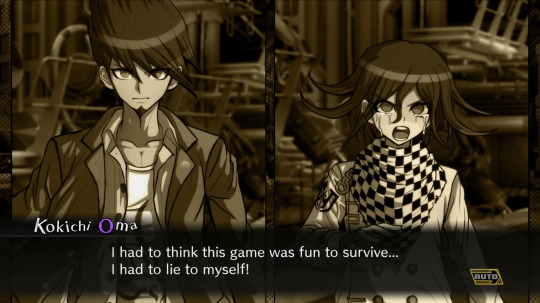
(post trial, chapter 5)
I’m inclined to believe everything that Kokichi says to Kaito in the exisal hanger. As Kiibo says when Kaito questions it, “I think his dying words may have been the honest truth.” Knowing he was about the die, and that he absolutely needed Kaito’s help to get his plan to break the killing game to work- to achieve his genuine, true goal- I don’t see any reason for him to lie.
This emotional distance extends past just the killing game. I think it's a key part of how he interacts with others around him.
Kokichi is an ultimate leader. I think he uses his talent throughout the game in an attempt to “lead” everyone from the shadows. He wanted to stop the killing game and escape with as many people as possible. However, his methods are very ends-justify-the-means. I believe that he did genuinely care about everyone at the ultimate academy, but in the detached way a distant king might care about his subjects. On the other hand, if he had to use or sacrifice a few as pawns for the greater good, that is what had to be done. It’s not like it didn’t emotionally affect him, but I think he was deliberately trying to keep his distance so that it would not impact him as much, and so that he could continue trying to tear the killing game apart with as many tools in his arsenal as possible.
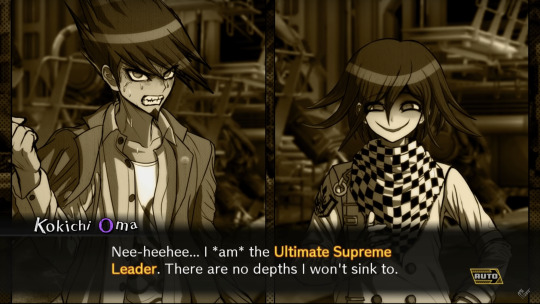
(post trial, chapter 5)
With this core motivation in mind, this brings us to Chapter 4.
In my opinion, the Killing Game Busters was never a plan that was meant to succeed. From an in-game perspective, the idea that he was originally going to follow this mercy kill plan doesn’t make sense to me. Firstly, Kokichi already had suspicions that they were being watched as early as chapter 3.
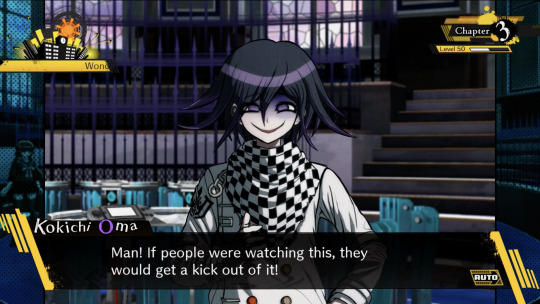
(post trial, chapter 3)
…and he later confirms that he was fully convinced of this fact when Monokuma agreed to reuse the chapter 4 motive in the virtual world.
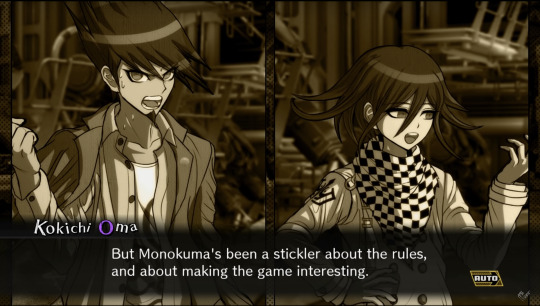
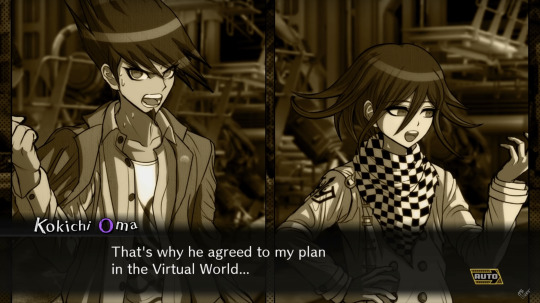
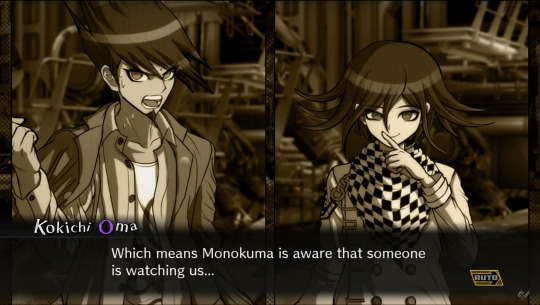
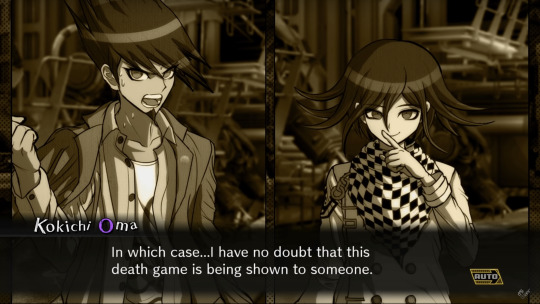
(post trial, chapter 5)
He knew that this killing game was for somebody else’s entertainment. I’ll go a bit into the secret of the outside world in a moment, but considering this, I don’t think he ever fully believed in it. Choosing to mercy kill everyone, in the name of a “truth” that was incompatible with what he had discovered… just doesn’t make sense to me.
Not to mention, from a narrative standpoint, I think the idea that he was completely for this mercy kill plan, decided to throw out the plan mid-trial, and then start an entirely different plan to end the killing game in chapter 5, isn’t very compelling. It weakens Kokichi’s overall character by making his motivation less cohesive and making him seem less organized over all, which I think is one of his strengths as a character. A Kokichi that is this fickle with what he’s trying to do would not have been able to write the script for chapter 5.
I think he always had different goals in mind with the Killing Game Busters. The first was something that is made very clear in chapter 5, but started here in chapter 4: He wanted to stop the killing to give himself room to break the game while minimizing deaths. The second was to further villainize himself, for all the reasons I talked about above, and some more I will get into in a little bit.
Seeing the secret of the outside world was undoubtably disturbing, regardless of whether he believed it or not; there is a noticeable shift in how Kokichi acts before and after he swipes that card key. Combined with discovering that Miu, someone he’d been working with closely, was planning on murdering him, I believe that seeing the destruction of the outside world pushed him towards more drastic measures than what he had been doing in previous chapters. He decided that in order for his plan in chapter 5 to work (which he had almost certainly already been planning at this point, considering how elaborate it was), he needed to make everyone question if pursuing the truth was the right thing to do at all.
After Miu’s body discovery, nobody was really worried about losing this class trial. Everyone had seen how Shuichi had guided them all to the truth and caught the blackened three times in a row, despite the unique difficulties in each case. They had full confidence in his abilities.
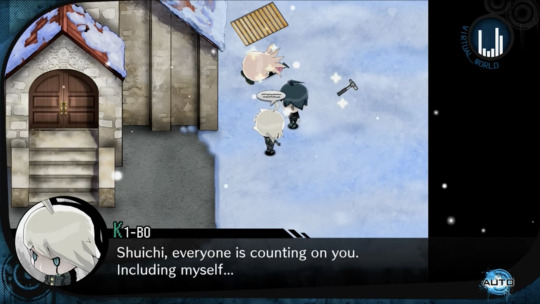
(investigation, chapter 4)
Shuichi is also not really doubting his abilities as a detective anymore. One of Shuichi’s core internal conflicts is his fear of the consequences of revealing the truth. Up to this point, it seems like he’s been moving past it. Especially after catching Korekiyo “Actual Serial Killer” Shinguji, who had no regrets or grey motivation for his killings. Shuichi’s morale, and subsequently everyone else’s, was at an all time high. (Of course, he was starting to feel a lot of pressure to solve these cases and save everyone on his own… but that’s another issue. ily Shuichi)
If Kokichi could take the wind out of Shuichi’s sails, really destroy the confidence he had built up so far, he could set up his impossible trial in chapter 5 to be more likely to work as intended. Everyone will be less motivated to try and figure out what happened if they are uncertain that finding the truth would actually result in anything good.
And I do believe he was trying to knock Shuichi off balance specifically. Damaging his confidence is one thing, but he was also deliberately trying to drive a wedge between him and Kaito. He antagonizes Kaito all chapter 4 investigation, including making up a nickname for Shuichi (“Shumai”) that directly riffs off Kaito’s closeness with Maki. He insists into the trial that he and Shuichi are partners now.
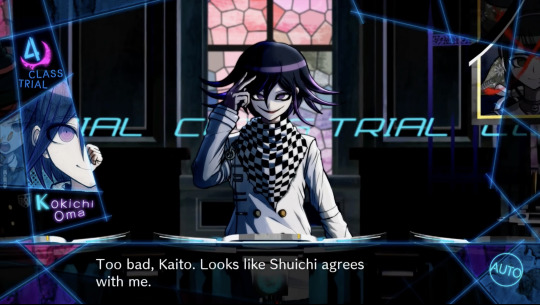
(class trial, chapter 4)
(Sidenote: Kokichi’s behaviour during trial 4 is genuinely really interesting to me. On top of the direct digs like this, he says a lot more subtle things to get under Kaito’s skin during trial 4 that I think are super neat to pay attention to.)
Theoretically, pushing Kaito away from Shuichi, combined with the powerlessness he’ll feel in the wake of the truth of both trial 4 and the outside world, could make him easier to convince to join Kokichi’s “side”. He even directly asks Shuichi to team up with him before leaving the virtual world:
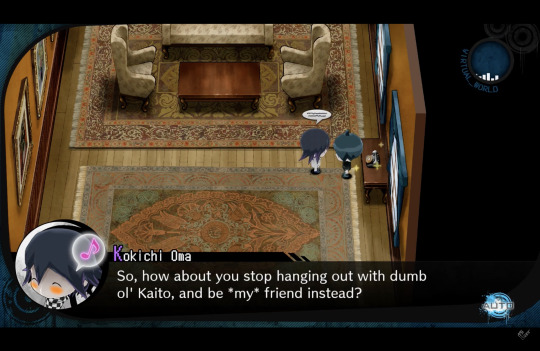
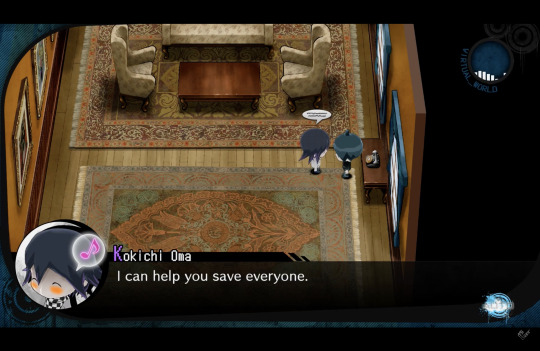
(daily life, Chapter 4)
This leads me to believe that Shuichi was originally the one that Kokichi intended to use to build his impossible trial. I mean, if Shuichi was the one in the exisal hanger and presumed dead instead of Kaito, the chances of everyone else solving that mystery drops Significantly. Everyone else, aside from maybe Kiibo, was 100% convinced that Kokichi was the mastermind at that point. No one except Shuichi would’ve tried to dig as deep as he did, for better or for worse. I think this idea is supported by the note that Kokichi wrote next to Shuichi’s face on the whiteboard in his room (“trustworthy?”). He was clearly considering Shuichi as a person for one reason or another, and I believe this is it.
By condemning Gonta, who everyone else perceived as a kind soul who would never hurt anybody, someone who was struggling to understand what the virtual world even was with his amnesia, would be perceived by the others as kicking someone when they were down. Gonta has an absolutely miserable time through the accusations and wholly blames himself for how things turned out in the end. That, and Gonta’s actions were even well-intentioned. The secret of the outside world was apparently so horrible, Gonta thought it would be kinder to mercy kill everyone rather than force them to face it. This result would make everyone question if the truth was really as undoubtably good as they had come to think so far; Not only did Gonta suffer because they had to find the truth, but seeking the secret of the outside world would apparently also only lead to suffering. This would make them hesitate during Kokichi’s impossible trial.
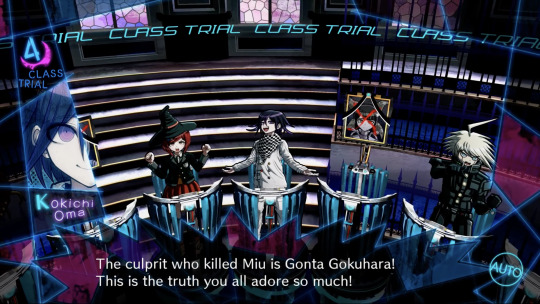
(class trial, chapter 4)
As I said before, Kokichi’s second goal for trial 4 was villainizing himself even further. He says that this was a goal himself to Kaito in chapter 5.
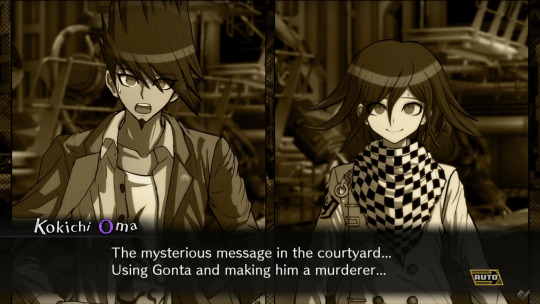
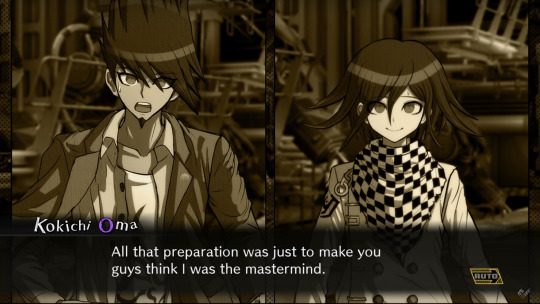
(post trial, chapter 5)
Part of this villainization was just adding to the persona he had already created for himself and that I already talked about his motivations for before. The other part was what he says here. He specifically wanted everyone to think that he was the mastermind. This gave him leverage in two main ways. First, making himself appear to be the mastermind with an actual mastermind as hands off as Tsumugi genuinely gave him power over everyone else. He used this in chapter 5 to put a pause to the killings and give himself more room to enact his plan to break the killing game from the inside.
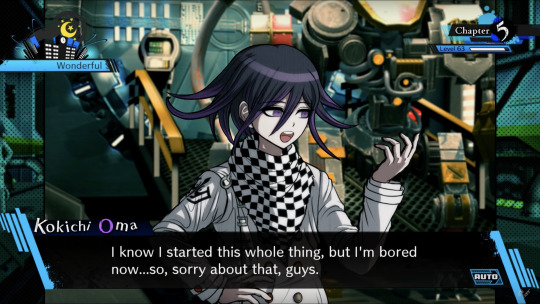
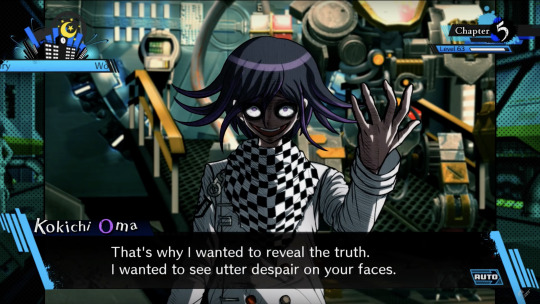
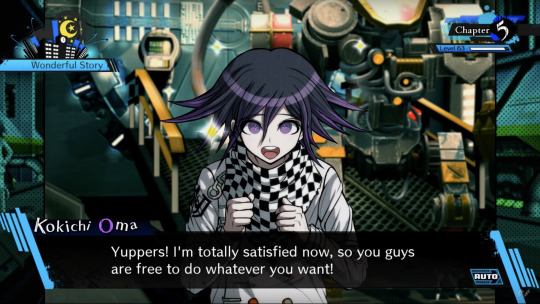
(daily life, chapter 5)
Although he then says “You guys can commit suicide together or kill each other… / Or, you can change your mind and stay here! You’re welcome to do that too!”, having experienced the secret of the outside world already, I think he’s pretty confident in what they will be feeling in this moment. No one is going to kill each other, and he knows that. He wants them to take that second option for the time being while he sets up his plot.
Making himself appear like the mastermind also benefited his impossible trial plan directly. Everyone would be much more likely to vote for someone they were convinced was the mastermind rather than one of their friends. No one would suspect that it was really him that was the victim.
“Using Gonta and making him into a murderer” was a significant part of how he villainized himself, but the way he treated Gonta during this whole experience was also a major factor. Starting as early as just after Miu was killed, he begins to be really aggressively mean to Gonta. He just straight up bullies him throughout the second half of the trial.
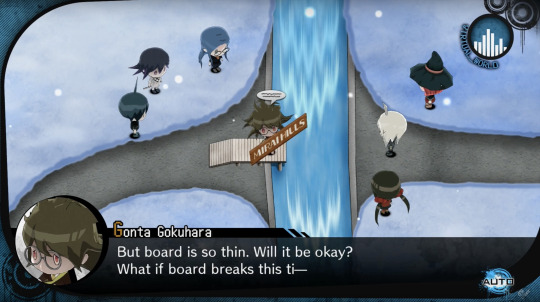
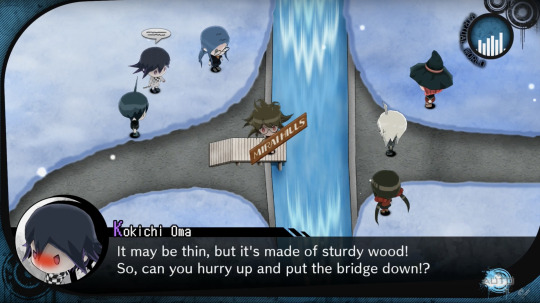
(daily life, chapter 4)
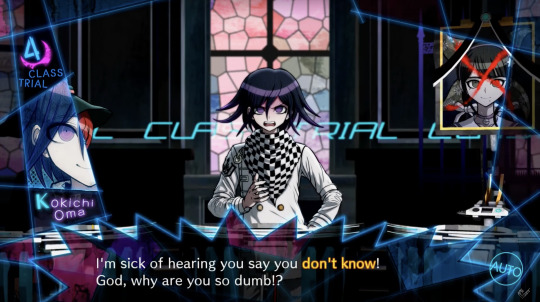
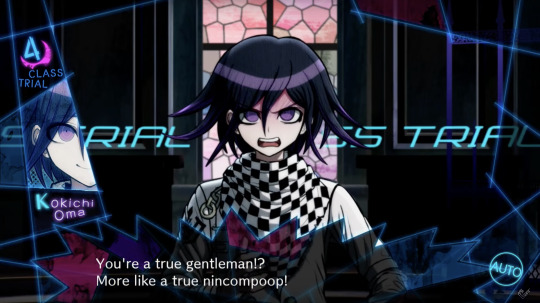
(class trial, chapter 4)
And then, after all this, he acts remorseful and sides himself with Gonta at the very end. It isn't genuine emotion like he felt before Kaede's execution, shown by his neutral expression. To me, this uncharacteristically open expression of grief feels like it was just set up to exacerbate the impact of his cruelty after Gonta’s execution. At this point, everybody’s little faith in Kokichi has been shaken significantly. With the shock of the trial, maybe you Could start to believe they were on the same side, as a team. Then, at the reveal of the extent of Kokichi’s manipulation, that is all ripped painfully away again.
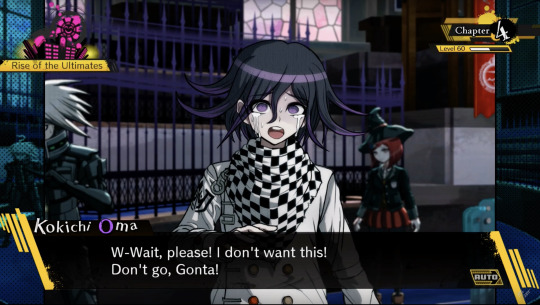
(post trial, chapter 4)
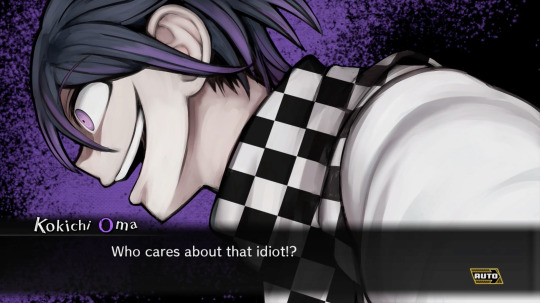
(post trial, chapter 4)
Even if these parts of trial 4 make my stomach turn, I don’t want to imply that Kokichi is completely cold-hearted and unfeeling. Actually, I think there were multiple moments in chapter 4 that show him struggling to regulate his emotions and keep face around everyone else while he enacted this plan.
1: I don’t think Kokichi initially planned to make the reveal that Gonta was the killer as dramatic (or frankly, a bit traumatic) as it ended up being. He had been carrying himself a certain way during the first half of the trial, and I think Shuichi lying to his face in front of everyone about Kokichi’s own alibi dramatically changed his attitude. I mean, Shuichi lied (as he had done almost every trial and gotten 0 flack for) and Tsumugi even called him out on it, but everyone believed him over Kokichi anyways. So when Kokichi lies, it’s completely inexcusable, even though he’s been working tirelessly on his own trying to save everyone?* But when SHUICHI lies, and gets caught in it, people go along with him? They don’t doubt their trust in him for even a second? This double standard infuriated him. It’s at this point that he completely shifts in energy. If Shuichi, no, everyone, is going to disrespect him like this, he was going to make them suffer for it.
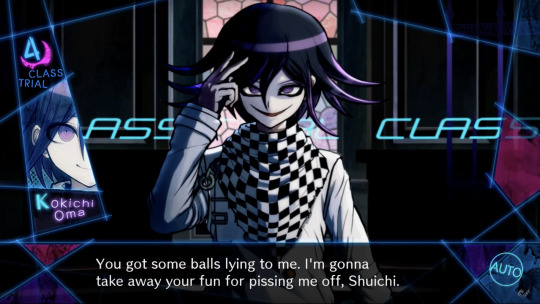
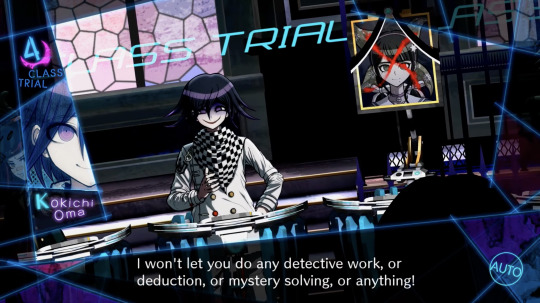
(class trial, chapter 4)
2: Kokichi only goes full villain after Kaito says “Kokichi, If you really cared for Gonta, explain yourself to everyone” in the post trial. I think that even though he was always going to paint himself as the villain, he was legitimately affected by the things that had just happened (Gonta’s death, Miu’s attempted murder, the secret of the outside world, even if he knew it wasn’t real) and what he’d just done. Even if he was trying hard not to be. The sudden shift he has from not saying anything to cackling about how little he cared about Gonta feels to me like he was kicking himself back into gear after trying to process some genuinely difficult emotions. 3: After Kokichi punches Kaito down, and everyone completely ignores him in favour of helping Kaito up, Shuichi says these iconic words to Kokichi: “Kaito always has us by his side, see? But no one wants to be around you. / You’re alone, Kokichi. And you always will be.” Kokichi responds like this:
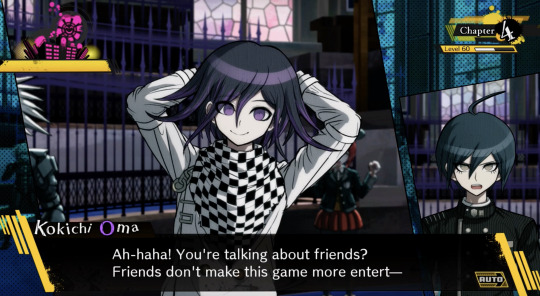
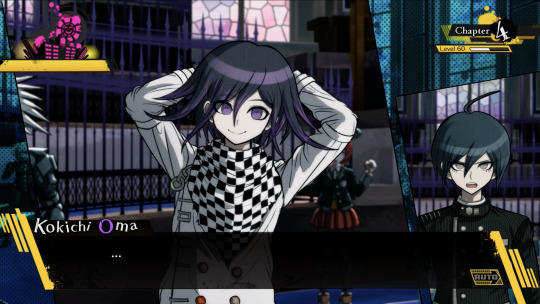
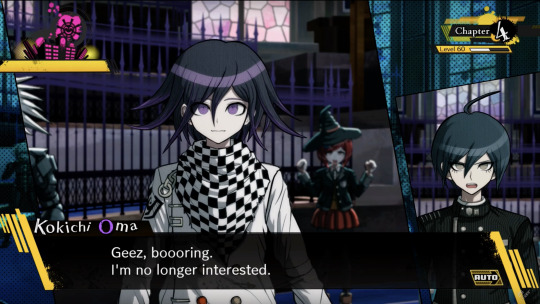
(Post-trial, chapter 4)
There’s something about the way he cuts himself off, pauses, and then his mask falls. I think Shuichi’s words got to him more than he wanted them to. Honestly, Kokichi’s attitude towards cooperation, keeping everyone at arm’s length, and insisting (to himself) that he (as a leader) must fix the killing game completely on his own just seems so lonely to me. Even if he is intentionally trying to alienate himself and get everyone to hate him, being so viscerally cut into like this must have hurt. Especially from someone he was trying to work to get onto his side. It’s no wonder he quickly left after this moment.
This is what I think drove Kokichi in chapter 4. He’s a leader who wants to “lead” his classmates into safety, but he isn’t afraid to use underhanded, cruel tactics if he thinks it will get him ahead in the game for the greater good. He viscerally represses his emotions in order to keep himself going and keep everyone else away from him. He tried to destroy Shuichi’s confidence and drive a wedge between him and Kaito to get him on his side for his plan. He used and made Gonta into a murderer to villainize himself and discourage everyone else from seeking the truth.
Whenever I imagine Kokichi on his own, out of the spotlight of the Audience or the eyes of his castmates, he’s never as expressive as he is in the open. I think in reality, Kokichi is a pretty depressed and lonely person. His clownish personality isn’t entirely a facade, and outside of a killing game scenario, I think he would act pretty similarly to how he does in game. But I do think that he uses it as a mask for his true emotions. While I feel like the “evil villain” persona is a genuine part of Kokichi’s personality, outside of the killing game he probably doesn’t act on it as deeply as he does in-game. I also think Kokichi struggles with letting people become close to him, even without anything on the line. The killing game just caused him to lean into these aspects of his personality hard, and in potentially the worst ways.
*I feel like here it’s important to mention that personally, I still think the collateral damage he caused in his attempts to stop the killing game matters. A lot. I don’t think he should be excused for the things he did, even if he had good intentions. This makes him a really interesting, morally grey character, and I like that about him.
#danganronpa v3#ndrv3#drv3#kokichi ouma#drv3 spoilers#gonta gokuhara#danganronpa v3 analysis#danganronpa theory
303 notes
·
View notes
Text


Here's an interesting little tidbit. According to several Japanese tweets, "pig feet" can be slang for "guns". This would explain the number of fanworks I've seen that give Kokichi hoplophobia.
290 notes
·
View notes
Text
Also I’m putting this “meaningless” line of dialogue from drunk monokid in the microwave there’s NO WAY this isn’t the big reveal of what the fuck is happening with the ultimate academy for gifted juveniles with all the spoilers redacted out I’m calling it here I know I’m right and I’m losing my goddamn MIND about it you can’t just DO THAT TO ME

#danganronpa spoilers#danganronpa v3#ndrv3#monokid#danganronpa theory#danganronpa v3 analysis#monokubs
16 notes
·
View notes